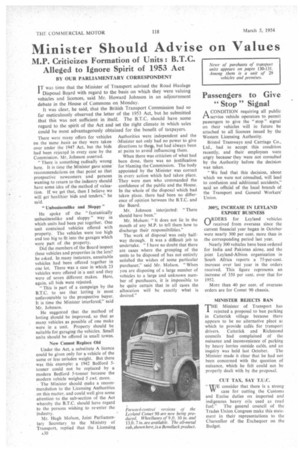Minister Should Advise on Values
Page 32

If you've noticed an error in this article please click here to report it so we can fix it.
M.P. Criticizes Formation of Units : B.T.C. Alleged to Ignore Spirit of 1953 Act
BY OUR PARLIAMENTARY CORRESPONDENT IT was time that the Minister of Transport advised the Road Haulage I Disposal Board with regard to the basis on which they were valuing vehicles and licences, said Mr. Howard Johnson in an adjournment debate in the House of Commons on Monday.
It was clear, he said, that the British Transport Commission had so far meticulously observed the letter of the 1953 Act, but he submitted that this was not sufficient in itself. The B.T.C. should have some regard to the spirit of the Act and set the right climate in which sales could be most advantageously obtained for the benefit of taxpayers.
There were many offers for vehicles on the same basis as they were taken over under the 1947 Act, but the bids had been rejectgd in every case by the Commission, Mr. Johnson asserted.
"There is something radicalb wrong here. It is time the Minister gave some recommendations on that point so that prospective newcomers and persons wanting to return to the industry should have some idea of the method of valuation. If we get that, then I believe we will get healthier bids and tenders." he said.
" Unbusinesslike and Sloppy"
He spoke of the "fantastically unbusinesslike and sloppy" way in which units had been put together. One unit contained vehicles offered with property. The vehicles were too high and too big to fit into the garages which were part of the property.
Did the members of the Board inspect these vehicles and properties in the lots? he asked. In many instances, unsuitable vehicles had been offered together in one lot. There was a case in which 23 vehicles were offered in a unit and they were of seven different makes. Here, again, all bids were rejected. "This is part of a campaign by the B.T.C. to see that lotting is most unfavourable to the prospective buyer. It is time the Minister interfered," said Mr. Johnson.
He suggested that the method of lotting should be improved, so that as many vehicles as possible of one make were in a unit. Property should be suitable for garaging the vehicles. Small units should be offered in small towns.
New Cannot Replace Old Under the Act, a substitute A licence could be given only for a vehicle of the same or less unladen weight. But there was this example: a 1942 Bedford Stormer could not be replaced by a modern Bedford 5-tonner because the modern vehicle weighed 5 cwt. more, The Minister should make a recommendation to the Licensing Authorities on this matter. and could well give some attention-to the sub-section of the Act whereby the B.T.C. should have regard to the persons wishing to re-enter the industry.
Mr. Hugh Molson, Joint Parliamentary Secretary to the Ministry or Transport, replied that the Licensing Authorities were independent and the 'Minister not only had no power to give directions to thew, but had always been at pains to avoid influencing them.
When there was criticism of what had been done, there was no justification for blaming the Commission. The body appointed by the Minister was correct in every action which had taken place. They were men who commanded the confidence of the public and the House. In the whole of the disposal which had taken place, there had been no difference of opinion between the B.T.C. and the Board.
Mr. Johnson interjected: " There should have been."
Mr. Molson: " It does not lie in the mouth of any M.P. to tell them how to discharge their responsibilities."
The work of disposal was only halfway through. It was a difficult job to undertake. "I have no doubt that there are cases where the grouping of the units to be disposed of has not entirely satisfied the wishes of some particular purchaser." said Mr. Molson. "When you are disposing of a large number of vehicles to a large and unknown number of purchasers, it is impossible to be quite certain that in all cases the allocation will be exactly what is desired."




































































































